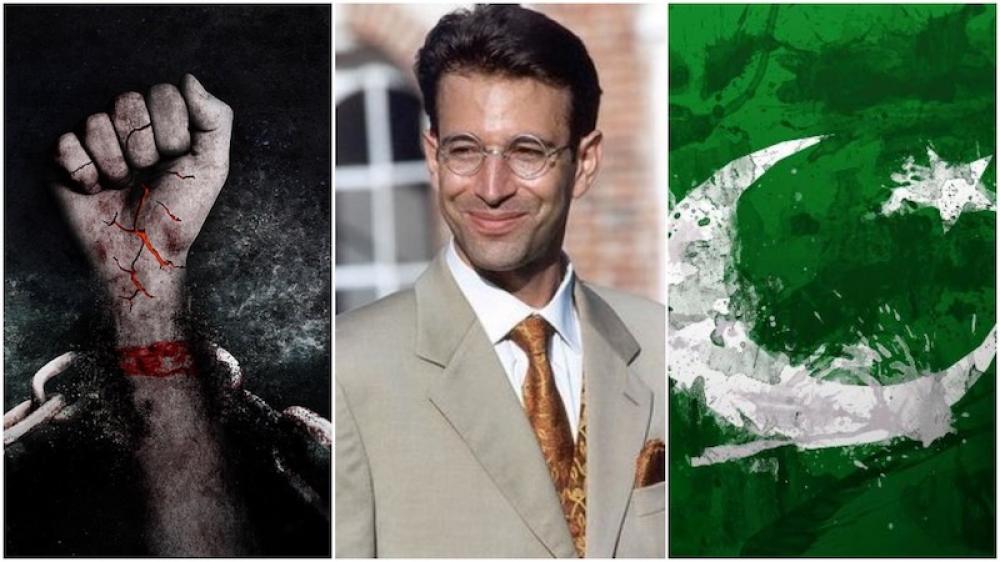Just Earth News | @justearthnews | 03 Apr 2020

Wkipedia Creative Commons
Washington: At a time when the world is fighting against the COVID-19 outbreak, Pakistan is busy letting terrorists go free. This is evident from the fact when a court in Sindh on Thursday commuted the death sentence of Ahmed Omer Saeed Sheikh- who was convicted 18 years ago for abducting and murdering the South Asia bureau chief of The Wall Street Journal Daniel Pearl- to seven years, prompting the slain scribe's father call the move a 'mockery of justice'.
Daniel Pearl's father Judea Pearl slammed the Pakistani court for overturning the death sentence of his son's killer Omar Sheikh and called it a "mockery of justice" and a "reprehensible decision".
He called on Faiz Shah, prosecutor general of Sindh, "to do his duty" and appeal to Pakistan Supreme Court.

“Anyone with a minimal sense of right and wrong now expects Faiz Shah, prosecutor general of [the Pakistani province] Sindh to do his duty and appeal this reprehensible decision to the Supreme Court of Pakistan," he was quoted as saying by New York Post.
World condemns Pakistan's 'mockery of justice':
Principal Deputy Assistant Secretary (PDAS) Alice Wells of the Bureau of South and Central Asian Affairs (SCA) of the US State Department tweeted "The overturning of the convictions for Daniel Pearl’s murder is an affront to victims of terrorism everywhere. We welcome Pakistan’s decision to appeal the verdict. Those responsible for Daniel's heinous kidnapping and murder must face the full measure of justice. AGW."
The overturning of the convictions for Daniel Pearl’s murder is an affront to victims of terrorism everywhere. We welcome Pakistan’s decision to appeal the verdict. Those responsible for Daniel's heinous kidnapping and murder must face the full measure of justice. AGW
— State_SCA (@State_SCA) April 2, 2020
United States Commission on International Religious Freedom (USCIRF) expressed its dismay over the court order and tweeted: "USCIRF expressed its dismay at the Sindh High Court of Pakistan overturning the death penalty against Omar Saeed Sheikh for the murder of @WSJ reporter Daniel Pearl."
USCIRF expressed its dismay at the Sindh High Court of Pakistan overturning the death penalty against Omar Saeed Sheikh for the murder of @WSJ reporter Daniel Pearl. https://t.co/t7Ezp9LtkW
— USCIRF (@USCIRF) April 2, 2020
USCIRF Commissioner Anurima Bhargava said: "This verdict shows not only the lack of accountability for Daniel Pearl’s murder but the misplaced priorities of the Pakistani legal system."
USCIRF @CommrBhargava: "This verdict shows not only the lack of accountability for Daniel Pearl’s murder but the misplaced priorities of the Pakistani legal system." (1/3) https://t.co/F3IyoXEHio
— USCIRF (@USCIRF) April 2, 2020
Expressing disappointment on the decision, Steven Butler, Asia program coordinator for the Committee to Protect Journalists, said: "“We urge prosecutors to appeal the decision."
Reacting to the Pakistan court order, the United Nations on Friday said those who take the lives of others must be held accountable.
"I have no specific comment except to say that obviously we stand against the use of the death penalty. We do, however, strongly believe that there needs to be accountability for people who take the lives of others, especially in this case the life of a journalist," Stephane Dujarric, Spokesman for UN Secretary General Antonio Guterres, said.
The National Press Club and the National Press Club Journalism Institute urged Pakistani courts to reconsider a ruling that would lessen the sentence of a man convicted of masterminding the 2002 murder of Wall Street Journal reporter Daniel Pearl.
"Ahmed Omar Saeed Sheikh should not, and must not, be a free man,” said National Press Club President Michael Freedman. “He lured Danny Pearl into captivity and he detained him against his will, which led to the journalist's murder, even if Sheikh did not himself behead Pearl. We call on the Supreme Court of Pakistan to ensure justice for Danny Pearl."
Angela Greiling Keane, the president of the National Press Club Journalism Institute said: “Our memory of Pearl has long inspired our fight for press freedom, and it continues to inspire it every day.”
The verdict was passed by a two-judge bench- headed by Justice Mohammad Karim Khan Agha- of the Sindh High Court.
Since the prime accused Sheikh has been in prison for the last 18 years, he is expected to be released with three other convicts, Fahad Naseem, Salman Saqib and Sheikh Adil, who were earlier handed over life sentence.
The court has rejected the state's plea seeking an enhancement of the three accused's life imprisonment.
An anti-terrorism court in 2002 had convicted Sheikh and the three others for abducting and murdering the 38-year old bureau chief who was researching a story on the religious extremism in Pakistan's Karachi.